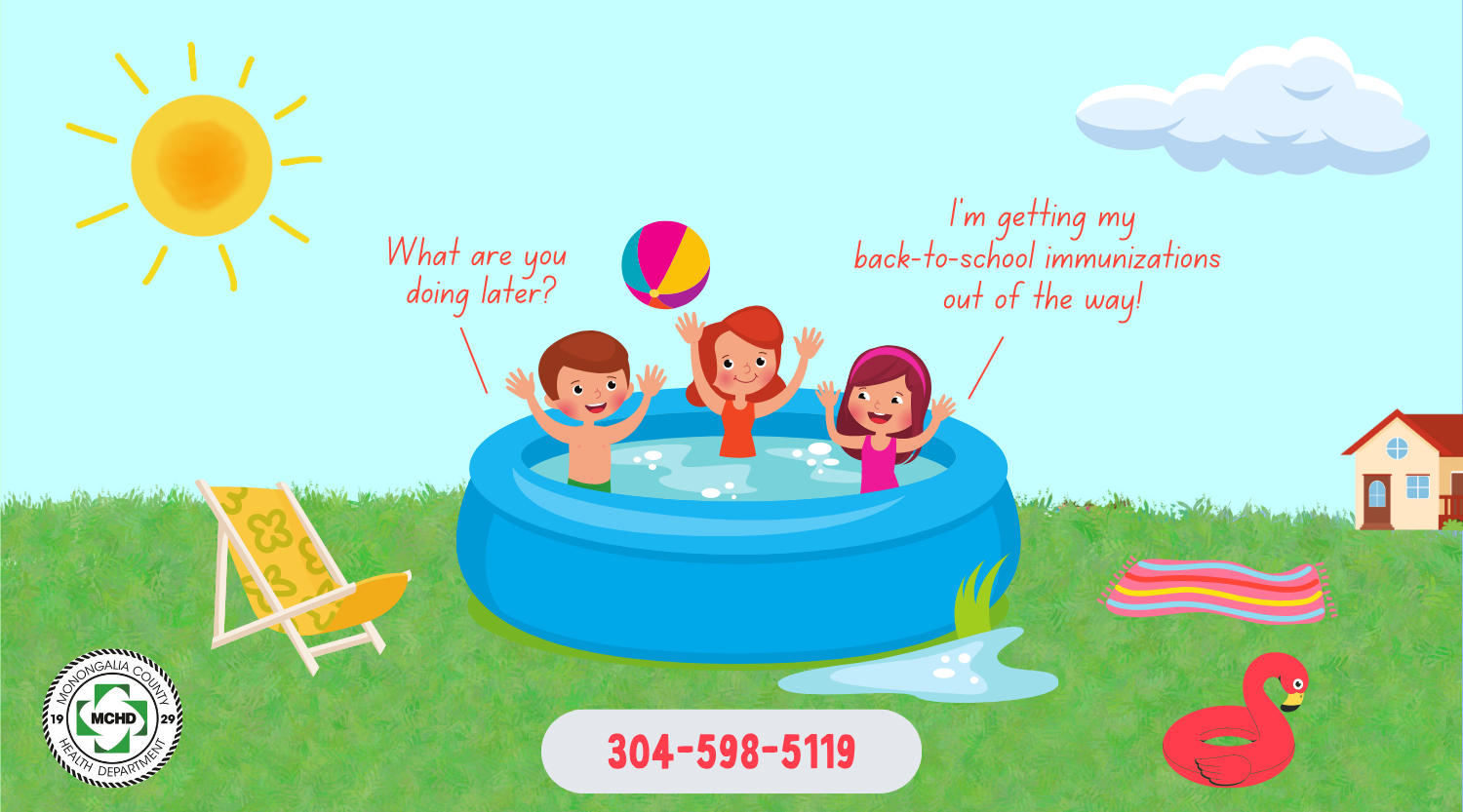It's not too early to get back-to-school vaccines

Jul. 24, 2023
By Mary Wade Burnside
A friend recently posted a photo of her pink-goggle-wearing 10-year-old daughter in her happy place: a swimming pool.
Her message: “Cannot believe there’s only six more weeks till school starts again! We’ve got to get out there and enjoy every minute.”
At Monongalia County Health Department, we enthusiastically support having safe fun. As well as taking advantage of this time before school starts.
So why wait to schedule your children’s back-to-school vaccines? Avoid the rush and make an appointment now, either with the student’s pediatrician or with Monongalia County Health Department’s Clinical Services program.
Sure, we understand how someone might consider mentioning vaccines in the same breath as summer as, well, a bit of a bummer. But do you know what else is a bummer? Being laid low by vaccine-preventable diseases, with kids missing school and parents having to take time off work.
So here’s the drill. Students need vaccines at various ages. Schoolchildren require immunizations when they are entering preschool and kindergarten as well as seventh and 12th grades.
Children ages 4 to 6 years old should get their second dose of chickenpox and MMR, which protects them from mumps, measles and rubella; their fourth dose of polio vaccine; and their fifth dose of DTaP, which prevents diphtheria, tetanus and pertussis, or whooping cough.
Teens and pre-teens should get three vaccines before the new school year: meningococcal conjugate vaccine to protect against meningitis and blood infections, or septicemia; Tdap, the vaccine that protects against tetanus, diphtheria and whooping cough for anyone over the age of 6; and Gardasil to prevent human papillomavirus (HPV).
The Centers for Disease Control and Prevention recommends that both girls and boys get the HPV vaccine at age 11 or 12. Those who get the vaccine in that age range only need two doses. Children older than 14 years require three shots to be given over six months. Also, three doses are still recommended for people with certain immunocompromising conditions ages 9 through 26 years.
Also, the CDC recommends that just about everyone over the age of 6 months get an influenza vaccine annually. These are generally available at your pediatrician’s office, at area pharmacies and at the health department in the fall.
And of course, there is the COVID vaccine. COVID kept school kids from attending classes in person. Getting your children vaccinated against COVID helps keep them and their teachers safe.
Click here to find out the specific requirements for attending school in West Virginia.
Vaccines are an important tool in keeping children healthy. Take advantage of any visit to the doctor — check-ups, sick visits, even physicals for sports, camps or college — to ask the doctor about what vaccinations your child needs.
Vaccines are the safest and most effective way to prevent several diseases. They are thoroughly tested before licensing and carefully monitored even after they are licensed to ensure that they are safe. The benefits of vaccination far outweigh any potential risk of side effects. All vaccines used in the United States require extensive safety testing before they are licensed by the U.S. Food and Drug Administration (FDA).
Schools are a prime venue for spreading many vaccine-preventable diseases and school-age children can further spread disease to their families and others with whom they come in contact. Being vaccinated helps stop the spread of disease to family, classmates and others in the community.
When a child comes down with a disease such as whooping cough or the flu, they may miss several days of school while recovering. A sick child may also mean that a parent has to miss work or other important events.
Vaccines do more than protect your child. Some diseases, like whooping cough and the flu, can be deadly for newborns or babies who are too young to be vaccinated themselves. Parents can help protect the youngest community members from being exposed to vaccine-preventable diseases by making sure their children get all recommended vaccines.
Mary Wade Burnside is the public information officer at Monongalia County Health Department.